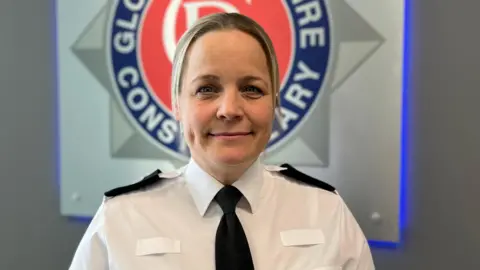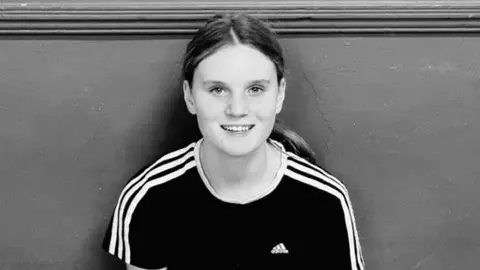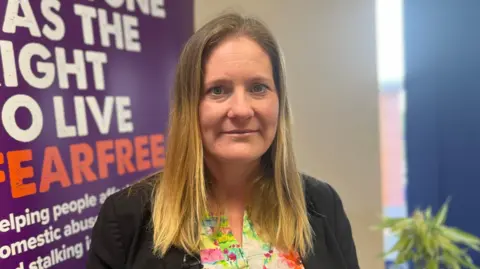'I thought the abuse was normal - he was my first proper boyfriend'
Lucy, not her real name, was just 13 years old when she met her ex-boyfriend online.
The start of their relationship was "like something out of a rom-com or romance novel".
"Within two weeks of first contacting him and adding him on social media, he was telling me he loved me," she said.
"At the time, I didn't know that's not necessarily normal for relationships."
She recalled how "in the flick of a switch" his personality had become "very dark", physically abusive and controlling.
"He was just very angry, very possessive," she said. "He had access to all my social media - all my passwords, all my logins.
"If people would message me and I was at school, he would message them back and then delete the chats, so I couldn't see it."
Lucy says she was not allowed to see family or friends and was "isolated" from everybody she knew and trusted.
"I thought it was normal, because he was my first proper boyfriend," she said.
- If you are affected by the issues in this story, help can be found at the BBC Action Line
- The BBC is also running a live page about online safety today, with exclusive stories and expert speakers. You can view it here.

Currently, the abuser and the victim must both be over 16 to meet the legal definition of domestic abuse.
While children living in abusive homes are legally recognised as victims of domestic abuse in their own right, this does not extend to under 16s in abusive relationships.
Abusive partners can still be charged with a variety of criminal offences – but it is not classified as domestic abuse.
This is something campaigners and some domestic abuse charities want to change.
'Radicalised'
NextLink, which provides domestic abuse support services in Bristol, South Gloucestershire and North Somerset, says it is seeing an increase in young people becoming victims of domestic abuse by boys of the same age.
Chief executive Sarah O'Leary is concerned social media and other online content are fuelling abusive behaviour and being used as a "toolbox on how to control women".
"We know there's been a rise in online misogyny and encouraging young men to act out those misogynistic values," she said.
"Much of the pornography that boys will view is violent towards women and girls.
"I do think a lot of the boys are witnessing that online and are being radicalised."
She is concerned this is not being recognised as abuse by the young victims involved and rather seen as part of a "normal relationship".
As part of implementing the Online Safety Act, Ofcom has now finalised a series of child safety rules which will come into force for social media, search and gaming apps and websites on 25 July.
It says the rules will prevent young people from encountering the most harmful content, including pornography, and are designed to protect children from misogynistic, violent, hateful or abusive material.

Lucy said she had seen first hand how that online world could become real life, with her ex-boyfriend watching pornography daily.
She said: "I personally think that it made his behaviour and opinion of sex very aggressive and violent."
He also used apps to track her location.
"I didn't realise that that's not normal," she said. "He would say things like, 'I don't want you to get hurt or get kidnapped' so you need to have your location on for me so I can see where you are."
She said if she did not answer the phone immediately to him, he would "verbally abuse" and shout at her.

Deputy chief constable Katy Barrow-Grint, of Gloucestershire Police, said cases like Lucy's were not uncommon.
"Most weeks there will be cases presented to us where there are teenagers who are boyfriend and girlfriend, where there is physical or sexual violence, which would be classified as domestic abuse if they were over 16," she said.
Ms Barrow-Grint is keen to stress that crimes involving young people will always be investigated, even if an offence is not legally classed as domestic abuse.
A survey, carried out by the Youth Endowment Fund in 2024, revealed nearly half of all teenage children who had been in a relationship had experienced violent or controlling behaviours from a partner.
The charity, which was given £200m by the Home Office to fund and evaluate anti-violence projects, asked more than 10,000 children aged 13-17 in England and Wales about their experiences.
At the time, Jess Phillips, minister for safeguarding and violence against women and girls, described the survey results as "heartbreaking and deeply concerning".
 Family handout
Family handoutThe issues around the age that domestic abuse victims are recognised by law was raised in the House of Commons in January, following a campaign by the family of murdered 15-year-old Holly Newton.
Holly was repeatedly stabbed in an alley in Hexham, Northumberland, by her ex-boyfriend Logan MacPhail after she ended their relationship.
MacPhail, then aged 16, had become controlling and was stalking Holly, sending texts and phone calls up to 40 times a day.
In a statement provided to the BBC a Home Office spokesperson said that the government "is determined to root out" abuse as part of its mission to halve violence against women and girls in a decade.
"We are considering every option to fundamentally transform the system and address this issue head on, and that includes everything from supporting victims to looking at whether we need to change the law," they added.
Gloucestershire Police is now working with the Home Office on a pilot project looking at potential changes in the law.
"What we will do here is flag anything that comes to us that appears to be domestic abuse involving young people," she said.
"We're going to talk to young people about their experiences.
"One of the potential activities that could happen is lowering the age [at which domestic abuse is recognised] - but the evidence base that we are collecting here in Gloucestershire will help with the discussions around that."

For Ms O'Leary, a change in the law cannot come soon enough, to prevent younger victims "falling through the gaps".
"My fear is that by not having them classed as domestic victims, we're not understanding the pattern of coercive and controlling behaviour and instead viewing them as single incidents or linked in with bullying, knife crime or serious violence," she said.
As well as reviewing the age at which domestic violence can be recognised, there are also calls for more education around healthy relationships.
Debbie Beadle is chief executive of the Wiltshire-based charity FearFree, which supports more than 10,000 adult and child victims every year across the South West.
"I don't think we just should rely on laws," she said. "I think there's a danger in criminalising children and ultimately what we should be looking at is early intervention and education around what a healthy relationship is.
"It's about looking at the messaging that our young people are getting on social media, through the games they're playing, the conversations that they're having at schools."
'I experienced it myself'
Ms Beadle feels professionals and parents need to overcome the fear of having open conversations with children.
"I do think sometimes we are still trapped in not wanting to talk about it because they're children and we shouldn't be talking about this and that's not helping," she said.
Lucy agrees that education around abuse in teenage relationships needs to be improved.
"I didn't understand any of it. They don't talk you through it at school. You just don't hear about child on child abuse," she said.
"You hear about it between parents or older people. I didn't really know much about domestic abuse until I experienced it myself."
She said this was partly why she wanted to share her story and help others understand that abuse can happen at any age.
Tonight's Points West on BBC One will be taking an in-depth look at issues around online safety, with exclusive stories and expert studio guests. You can watch it live at 18:30 BST or afterwards on the BBC iPlayer.
Follow BBC West on Facebook, X and Instagram. Send your story ideas to: [email protected] or via WhatsApp on 0800 313 4630.
